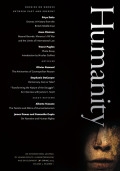HUMANITY VOLUME 6, ISSUE 2
 This issue opens with Carolyn Dean’s compelling inquiry into how critics have deliberated about “atrocity” in photography, turns to an exciting roundtable organized by Michele Alacevich on the legacies of Albert O. Hirschman’s work, includes an excerpt from Gregory Mann’s newest book and an interview with the author by Kenneth Harrow and Janet Roitman, before concluding with a photo essay by Katherine Chandler on Cold War “drones” and two excellent review essays of new books.
This issue opens with Carolyn Dean’s compelling inquiry into how critics have deliberated about “atrocity” in photography, turns to an exciting roundtable organized by Michele Alacevich on the legacies of Albert O. Hirschman’s work, includes an excerpt from Gregory Mann’s newest book and an interview with the author by Kenneth Harrow and Janet Roitman, before concluding with a photo essay by Katherine Chandler on Cold War “drones” and two excellent review essays of new books.
TABLE OF CONTENTS
. . . the dignity of the victims cannot be “given by the photographer” . . . ; it must inhere in their own stoicism or defiance, and it is, in a sense, their gift to us. —John Benthall1 Harrowing images of death, injury, and of people in various states of distress, terror, and vulnerability circulated by humanitarian organizations, memorial museums, and exhibits seek to encourage empathy with disempowered victims. Such images, in the form of amateur snapshots, photojournalism, and art photography of atrocities, are
Read More »
Introduction Michele Alacevich Albert O. Hirschman died on December 10, 2012, after a long, eventful, and at times truly adventurous life. Born in 1915 Berlin as Otto Albert Hirschmann, he belonged to the last generation of upper-crust, assimilated Jews in democratic interwar Germany. As a young social democrat, he observed with increasing concern the polarization of the political life in postwar Germany before the collapse of the Weimar Republic. When Adolf Hitler seized power in 1933, seventeen-year-old Hirschman went to Paris and did not return
Read More »
Gregory Mann’s new book, From Empires to NGOs in the West African Sahel: The Road to Nongovernmentality (Cambridge: Cambridge University Press, 2014), is excerpted here, as a prelude to an interview with the author.* Frantz Fanon was growing angry. It was 1960, and he was deep in Mali, a vast country, “fervent and brutal,” a place where there was “no need of great speeches.” The country had just gained independence from France weeks before, and its new president, Modibo Keita, “ever militant,” had assured him
Read More »
The Humanity editorial collective asked Kenneth Harrow and Janet Roitman to join us in posing some questions to Gregory Mann on the publication of his new book From Empire to NGOs in the West African Sahel: The Road to Nongovernmentality (Cambridge, 2015). The transcript of the discussion follows. Humanity: Could you briefly lay out the topic of the book? Gregory Mann: The book asks what “government” has meant in a part of the world where its meaning was particularly dynamic, slippery, and contentious in the period from the 1940s through the
Read More »
In 1953, a press release by Ryan Aeronautical promoted a previously classified drone with a headline touting the pilotless plane as a “bee with an electronic brain.” Known as the Firebee, the unmanned, jet-powered aircraft trained anti-aircraft gunners in all branches of the U.S. military. Today drones continue to serve as practice targets, even though lethal models deployed by the military dominate the popular imaginary. In the Cold War, however, the bee-like drones generated relatively little public interest; compared with other aerospace developments of the period,
Read More »
The Ironic Spectator: Solidarity in the Age of Post-Humanitarianism Lilie Chouliaraki Cambridge: Polity, 2013. ix + 238 pp. The Cruel Radiance: Photography and Political Violence Susie Linfield Chicago: University of Chicago Press, 2010. xiii + 321 pp. Contemporary forms of humanitarianism began to emerge in Europe and the Americas in the late seventeenth and early eighteenth centuries, originating from a mixture of religious and Enlightenment ideas.1 In a context marked by the rapid rise of industrialization, urbanization, and market expansion, and the development of modern nation-states,
Read More »
The Language of Human Rights in West Germany Lora Wildenthal Philadelphia: University of Pennsylvania Press, 2013. 1 + 277 pp. Human Rights in our Own Backyard: Injustice and Resistance in the United States William T Armaline, Bandana Purkayastha, Davita Silfen Glasberg Philadelphia: University of Pennsylvania Press, 2011. xiv + 325 pp. The Language of Human Rights How do we know we’re talking about the same thing when we invoke human rights? Standard definitions of human rights point to the protection of basic human dignity and
Read More »
 This issue opens with Carolyn Dean’s compelling inquiry into how critics have deliberated about “atrocity” in photography, turns to an exciting roundtable organized by Michele Alacevich on the legacies of Albert O. Hirschman’s work, includes an excerpt from Gregory Mann’s newest book and an interview with the author by Kenneth Harrow and Janet Roitman, before concluding with a photo essay by Katherine Chandler on Cold War “drones” and two excellent review essays of new books.
This issue opens with Carolyn Dean’s compelling inquiry into how critics have deliberated about “atrocity” in photography, turns to an exciting roundtable organized by Michele Alacevich on the legacies of Albert O. Hirschman’s work, includes an excerpt from Gregory Mann’s newest book and an interview with the author by Kenneth Harrow and Janet Roitman, before concluding with a photo essay by Katherine Chandler on Cold War “drones” and two excellent review essays of new books.